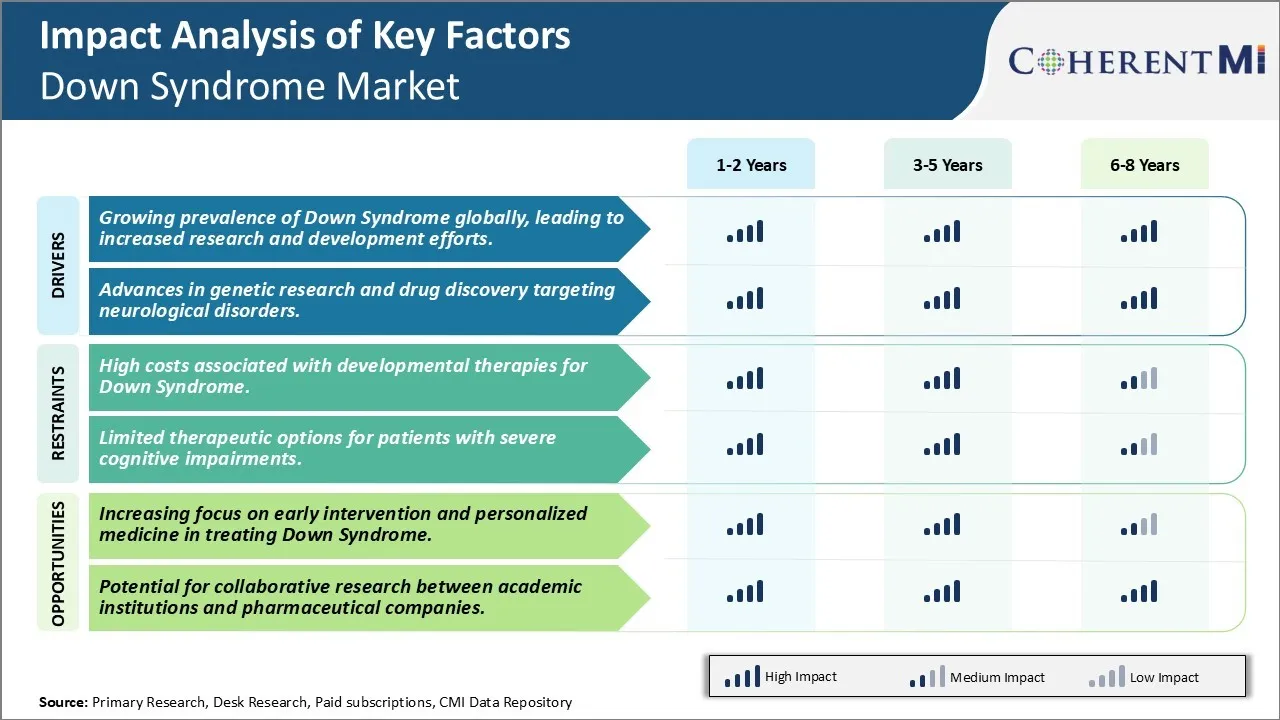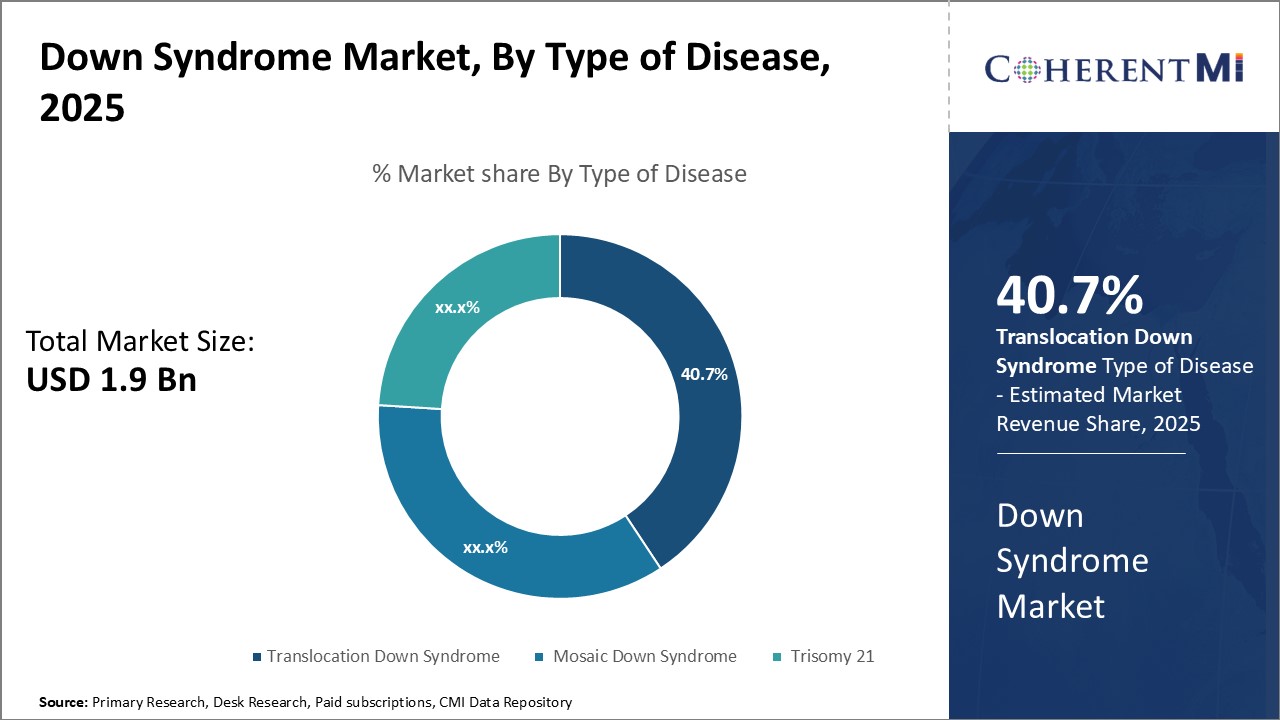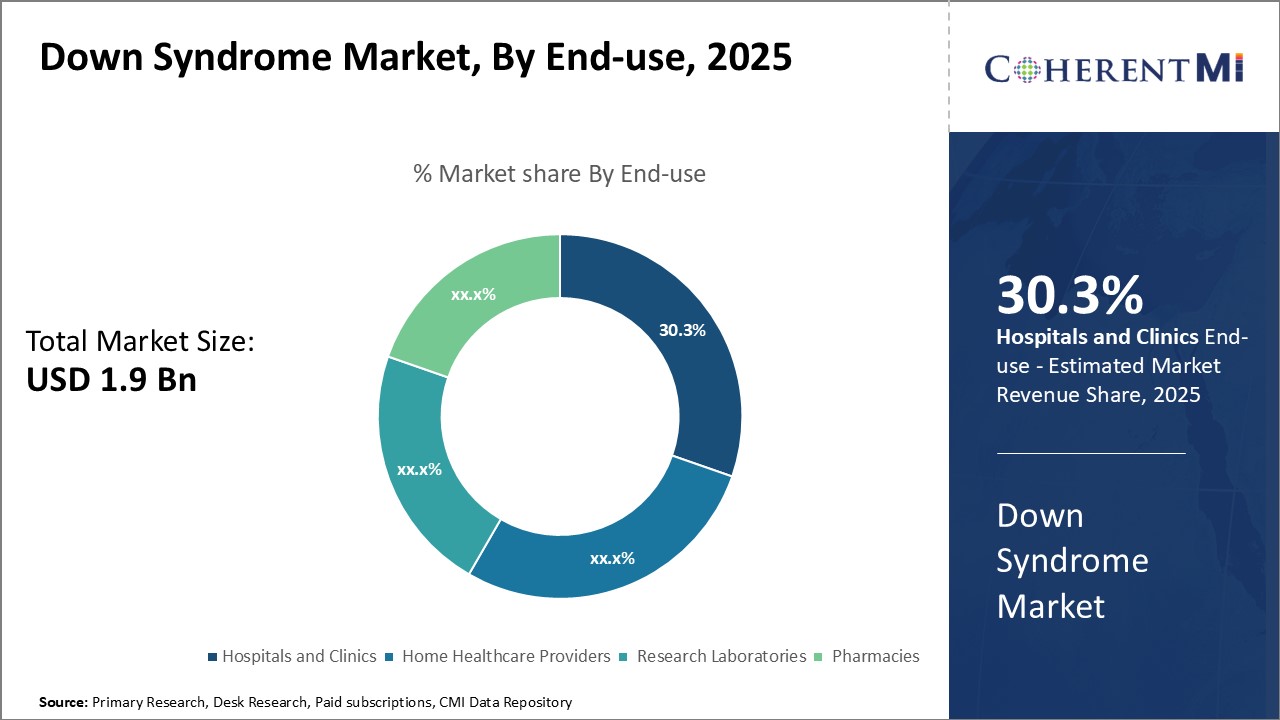Down Syndrome Market Size - Analysis
The market is expected to witness positive growth over the forecast period owing to rising prevalence of Down Syndrome, increasing government initiatives to support people with intellectual disabilities, and continuous development of novel drugs and therapies to improve quality of life. However, lack of disease-modifying drugs and high cost of advanced therapies are some challenges hindering faster adoption.
Market Size in USD Bn
CAGR5.3%
| Study Period | 2025-2032 |
| Base Year of Estimation | 2024 |
| CAGR | 5.3% |
| Market Concentration | High |
| Major Players | AC Immune SA, Alzheon, Inc., Annovis Bio, Inc., ManRos Therapeutics, NeuroNascent, Inc. and Among Others |
please let us know !
Down Syndrome Market Trends
The growing prevalence of Down Syndrome cases around the world has been a major driver propelling the market growth. According to several studies conducted in recent years, around one in every 1000 live births results in a baby born with Down Syndrome. While in the past, many children with Down Syndrome did not survive beyond early childhood primarily due to congenital heart diseases. However, with advances in neonatal care and medical science, survival rates for individuals with Down Syndrome have significantly improved over the last few decades. As a result, both the number of people living with the condition and the average lifespan of affected individuals has increased sharply.
Pharmaceutical firms and biotech companies are ramping up research towards developing innovative drugs, gene therapies and diagnostic tests. NGOs and non-profit organizations are expanding programs centered around education, job training, independent living and advocacy.
Market Driver - Advances in Genetic Research and Drug Discovery Targeting Neurological Disorders Boosts Industry Growth.
Establishment of sophisticated 'organs-on-chip' and 'brain-on-chip' microfluidic platforms is enabling preclinical evaluation of drug candidates on human cells and tissues in a highly predictive manner. Such technology platforms are greatly boosting drug screening and shortening development timelines. Gene therapies are also emerging as a promising alternative where candidate genes can be introduced, silenced or edited directly inside the human body or stem cells to rectify genetic defects. The market is witnessing increasing deal-making and partnership activities as firms seek to leverage each other's complementary capabilities and assets. Consequently, the treatment landscape is expanding steadily with more pipeline candidates and clinical trials. This wave of advancement in genetic sciences and drug innovation is opening up a very lucrative growth vertical within the broader Down Syndrome market in the coming decade.

One of the major challenges faced by the Down Syndrome market is the high costs associated with developmental therapies. Caring for a child with Down Syndrome poses significant financial burden on families as they require lifelong medical care, education support and therapies. Early intervention therapies such as occupational therapy, physical therapy and speech therapy play a crucial role in the development of children with Down Syndrome. However, these intensive therapies can be highly expensive, sometimes costing thousands of dollars per year. Additionally, as individuals with Down Syndrome age, they may require other long-term therapies and medical care for common comorbidities including heart diseases, gastrointestinal issues, thyroid problems etc. All of this leads to continuously rising medical costs throughout their lifetime. The high therapy expenditures often put significant stress on families and dissuade some from opting for regular treatments which can negatively impact the condition and quality of life of children. This high-cost barrier poses a major challenge for the industry in terms of access to crucial developmental and medical care.
Market Opportunity- Increasing Focus on Early Intervention and Personalized Medicine in Treating Down Syndrome.
Key winning strategies adopted by key players of Down Syndrome Market
Novel drug development: Developing novel and first-in-class drugs for Down syndrome has been a major winning strategy. In 2021, Roche received FDA approval for risdiplam for spinal muscular atrophy, marking the first approved disease-modifying treatment. This gave them a major competitive advantage. Similar drugs in development include avapritinib by Blueprint Medicines for myeloid cancers with a genetic mutation.
Patient Engagement Programs: Launching programs to educate, support and engage patients and caregivers has driven adherence and brand loyalty. In 2019, Roche partnered with Global Down Syndrome Foundation to launch 'Go21' aimed at increased exercise for people with Down syndrome. 77% patients reported increased physical activities through this outreach.
Partnering With Advocacy Groups: Collaborating with leading Down syndrome advocacy groups like National Down Syndrome Society provides access to their networks and communities. In 2020, PTC partnered with NDSS and Global Down Syndrome Foundation for their clinical trials and awareness programs around the world.
Segmental Analysis of Down Syndrome Market
 Insights, By Type of Disease, Genetic Abnormalities Drive Translocation Down Syndrome Prevalence
Insights, By Type of Disease, Genetic Abnormalities Drive Translocation Down Syndrome PrevalenceBy Type of Disease, Translocation Down Syndrome is expected to contribute the highest share 40.69% in 2025 owing to its genetic predisposition. Translocation Down Syndrome occurs due to a chromosomal abnormality where an extra chromosome 21 attaches to another chromosome, usually chromosome 14. This genetic translocation can occur either during the formation of reproductive cells in a parent or in early fetal development. As a result, individuals with Translocation Down Syndrome inherit the translocated chromosome 21 from a parent who carries a balanced translocation - meaning they are typically unaffected but can pass on the translocation to their children. Since the genetic translocation is heritable, it persists across generations and increases the likelihood of offspring developing the condition. Along with its inheritable nature, lack of screening and low awareness in high-risk communities and developing nations also contribute to the dominance of Translocation Down Syndrome within this market segment.

By End-use, Hospitals and Clinics is expected to contribute the highest share 30.34% in 2025 due to advanced healthcare infrastructure and expertise. Hospitals and clinics offer comprehensive care facilities equipped to handle complex cases of Down Syndrome from pregnancy and childbirth through to adulthood. They have specialized staff including geneticists, pediatricians, therapists and nurses trained to diagnose, treat and manage the condition. Many also offer prenatal screening, genetic counseling and multidisciplinary care approaches. given the multifaceted nature of Down Syndrome, access to advanced facilities, round-the-clock care and coordinated treatment protocols concentrated in hospitals drives much of the market demand within this segment. Furthermore, most national healthcare systems and insurance policies have provisions covering hospital-based care, incentivizing treatment seeking at such institutions.
Insights, By Treatment Type, Diagnostics Dominate due to Emphasis on Early Identification.
Additional Insights of Down Syndrome Market
The Down Syndrome therapeutic landscape is evolving with increasing attention from pharmaceutical companies aiming to address the unmet medical needs of individuals with this condition. AC Immune's ACI-24 vaccine represents a novel approach in leveraging immunotherapy to target amyloid plaques that are associated with cognitive decline in Down Syndrome. Meanwhile, Alzheon, Inc. is working on a small molecule drug aimed at preventing amyloid accumulation, another key driver of cognitive issues in this population. The pipeline of drugs under development is diverse, ranging from early-stage trials focused on understanding molecular mechanisms to advanced-phase trials exploring clinical efficacy. Despite significant progress, challenges remain, particularly around the high cost of therapeutic development and the limited understanding of how to target the genetic causes of Down Syndrome. However, the focus on personalized medicine and collaborative research efforts is likely to drive future advancements in this space, offering hope for more effective treatments for individuals living with down syndrome.
Competitive overview of Down Syndrome Market
The major players operating in the Down Syndrome Market include AC Immune SA, Alzheon, Inc., Annovis Bio, Inc., ManRos Therapeutics, NeuroNascent, Inc., Natera, Next Biosciences, AtilaBiosystems, Demeditec Biosystems, Myriad Genetics, Abnova Corporation and Thermo Fisher Scientific.
Down Syndrome Market Leaders
- AC Immune SA
- Alzheon, Inc.
- Annovis Bio, Inc.
- ManRos Therapeutics
- NeuroNascent, Inc.
Down Syndrome Market - Competitive Rivalry

Down Syndrome Market
(Dominated by major players)
(Highly competitive with lots of players.)
Recent Developments in Down Syndrome Market
- In August 2024, AC Immune SA announced progress in its Phase I/II trials for ACI-24, a vaccine aimed at treating neurological conditions, including Alzheimer's Disease and Down Syndrome. This development highlights AC Immune’s focus on reducing amyloid plaques associated with cognitive decline in Down Syndrome.
- In July 2024, Alzheon, Inc. announced its Phase II study on a small molecule drug designed to prevent amyloid accumulation in Down Syndrome patients, showing promising results in preclinical models.
- In June 2024, Annovis Bio, Inc. revealed positive results in its Phase I trials for a neuroprotective compound aimed at improving cognitive function in individuals with Down Syndrome, signaling potential for a novel treatment approach.
Down Syndrome Market Segmentation
- By Type of Disease
- Translocation Down Syndrome
- Mosaic Down Syndrome
- Trisomy 21
- By End-use
- Hospitals and Clinics
- Home Healthcare Providers
- Research Laboratories
- Pharmacies
- By Treatment Type
- Diagnosis
- Therapy

Would you like to explore the option of buying individual sections of this report?
Ghanshyam Shrivastava - With over 20 years of experience in the management consulting and research, Ghanshyam Shrivastava serves as a Principal Consultant, bringing extensive expertise in biologics and biosimilars. His primary expertise lies in areas such as market entry and expansion strategy, competitive intelligence, and strategic transformation across diversified portfolio of various drugs used for different therapeutic category and APIs. He excels at identifying key challenges faced by clients and providing robust solutions to enhance their strategic decision-making capabilities. His comprehensive understanding of the market ensures valuable contributions to research reports and business decisions.
Ghanshyam is a sought-after speaker at industry conferences and contributes to various publications on pharma industry.
Frequently Asked Questions :
How Big is the Down Syndrome Market?
The Global Down Syndrome Market is estimated to be valued at USD 1.90 Bn in 2025 and is expected to reach USD 2.73 Bn by 2032.
What will be the CAGR of the Down Syndrome Market?
The CAGR of the Down Syndrome Market is projected to be 5.1% from 2024 to 2031.
What are the major factors driving the Down Syndrome Market growth?
The growing prevalence of down syndrome globally, leading to increased research and development efforts and advances in genetic research and drug discovery targeting neurological disorders are the major factor driving the Down Syndrome Market.
What are the key factors hampering the growth of the Down Syndrome Market?
The high costs associated with developmental therapies for down syndrome and limited therapeutic options for patients with severe cognitive impairments are the major factor hampering the growth of the Down Syndrome Market.
Which is the leading Type of Disease in the Down Syndrome Market?
Translocation Down Syndrome is the leading segment.
Which are the major players operating in the Down Syndrome Market?
AC Immune SA, Alzheon, Inc., Annovis Bio, Inc., ManRos Therapeutics, NeuroNascent, Inc., Natera, Next Biosciences, AtilaBiosystems, Demeditec Biosystems, Myriad Genetics, Abnova Corporation, Thermo Fisher Scientific are the major players.